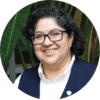Culture means something different to everyone. Every individual represents an amalgamation of diverse subcultures derived through unique life experiences. Ultimately, culture shapes how we present ourselves to the world, how we interact with people, how we approach different situations, and how we behave in certain settings throughout our lives.
We asked four members of the Pacific Oaks College & Children’s School community to explore the role culture plays in our interactions with others and discuss how we can respectfully continue to break the barriers among cultures in our society.

Dr. Jack Paduntin
brings more than 20 years of experience in higher education leadership positions to his role as president of Pacific Oaks
College & Children’s School. Dr. Paduntin earned an MBA in International Management at the University of Dallas, then proceeded to Alliant International University where he obtained his Doctor in Business Administration, Strategic Management.

Donald E. Grant Jr., Psy.D.,
is the executive director of Pacific Oaks College’s Center for Community & Social Impact. He has also served as the dean of the School of Human Development and the clinical training director for the Marriage and Family Therapy program. Dr. Grant’s latest publication “Black Men, Intergenerational Colonialism, and Behavioral Health: A Noose Across Nations” is now available.

Judith Krause, Ed.D.,
is a core faculty member in the School of Education at Pacific Oaks College. She teaches in the B.A. and M.A. Early Childhood Education (ECE) programs as well as oversees the ECE programs at the college’s instructional sites.

Eugenia Rodriguez, Psy.D., LMFT,
is a core faculty member in the School of Cultural and Family Psychology at Pacific Oaks College. She is a licensed marriage and family therapist and coordinator of the Latinx Family Studies program.

Q: In your experience, how can the influence of cultural norms affect our interpersonal relationships?
Dr. Grant:I grew up in a very poor community, and I was bussed to an honor school outside of my neighborhood from fifth to 12th grade. When I would go back to my neighborhood—it was a housing project—my friends would say, “You talk white.” So when we talk about the intersection of culture and interpersonal relationships, certain groups of people have to master the cultural norms for each space in which they have to exist, and sometimes it’s for survival. I had to master slang language that I would not have had to pay attention to if my academic environment was congruent with my neighborhood environment, but it wasn’t.
Dr. Rodriguez: Yes, I think what people try to do sometimes is essentially norm-matching. They try to adjust for the different groups they belong to. I am a woman of color, a queer woman, and a first-generation American. There are all these different cultures, and it really depends on how much weight we place on a particular cultural label during an interaction.
Q: How does this play out every day in professional settings?
Dr. Paduntin: I think in the business world people tend to behave a bit differently. They may represent themselves in the workforce differently than who they are outside of their profession. For business leaders, this can create conflict, specifically if they are leading a corporation focused on corporate social responsibility, but they don’t reflect those same values in their personal life.
Q: What are some common ways someone might unintentionally disrespect another’s culture during an interaction?
Dr. Krause: In educational settings, it’s pretty common for new teachers to be so focused on bringing an anti-biased approach to their classroom that they actually end up bringing in all kinds of biases. It turns into a tourism approach. For example, they may think, “I have a Chinese American child in my class, so I’m going to decorate the classroom and celebrate the Lunar New Year.” But maybe in that child’s family, it is not something they do. That’s why it is so important for educators to communicate with families.
Dr. Rodriguez: I always tell my students the road to hell is paved with good intentions. For example, I find within my clinical practice when discussing LGBTQ identities that family members tend to say, “I accept you, but I wish that you were heterosexual.” When we unpack why this is said, it’s often because they don’t want their family member to suffer; they want them to feel loved and safe. While they may not intend to be offensive, it is not the right approach and is definitely disrespectful.
Q: How can we seek to learn more or inquire about another’s culture respectfully?
Dr. Grant:One of the biggest evidence-based approaches to this is the jigsaw technique. The concept is to bring different groups of people together and assign them a project to complete or a goal to reach. Every person in that group has an integral part in reaching that goal or completing the project. It helps foster relationships built upon reliance in order to complete the project and creates an experience that can re-humanize an individual or group for whom you may have had these negative views and thoughts about.
Dr. Rodriguez: It is important to recognize that it shouldn’t be on the other person to explain their entire culture to you. It is your responsibility to actively seek multiple paths for more information.
Dr. Paduntin: A great way to think about this is to consider who has a greater understanding of cultural differences—someone who has traveled to many different countries nonstop for the last five years or someone who has been to just three but learns each of the languages? We must be intentional about learning if we truly want to understand another culture. There should never be a moment when you think you’ve learned a sufficient amount.
Dr. Krause: Once I was on the floor with young children. We had family albums, and children would look at these albums of different families. A set of twins in our class had two moms, and their album had their parents’ wedding picture. The next day, some of the other children came in and said to the twins, “Well, my mom said that two moms can’t be married.” So just sitting down and telling children, letting them know that maybe in your family you believe one thing but it’s OK that in other families they believe something different. Just something little like that makes a big difference.
Q: How does experiencing other groups and cultures help strengthen our relationship skills throughout life?
Dr. Krause: For educators, it’s all about acceptance and really helping children to understand who’s with them in their class. Children may not come in with biases, but they may develop them without proper guidance.
Dr. Grant: We live in some of the most segregated communities in the world in the United States. So the ability to experience someone else’s culture is critical. But you have to be deliberate about it. Deliberately seeking out corrective emotional experiences can help dismantle all the toxins in the world.
Learn more about Pacific Oaks College
If you would like to learn more about the academic programs available at Pacific Oaks, fill out the form below to request more information, or you can apply today through our application portal.

